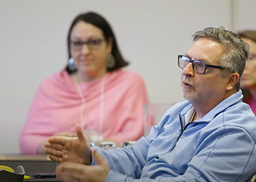Creating the End of Rotation™ Exam
Working in education is about legacy. PA educators put their strongest professional efforts into producing the best of tomorrow and working hard with colleagues to deliver learning students will remember through their career. Sometimes, however, educators can come together and produce something extra special.
The PAEA End of Rotation™ exams are marking their 10th anniversary this year. They’re an assessment tool that’s been updated over the last decade but from the beginning, members of PAEA knew they were producing something that was more than just another assessment tool.
“We are protecting the programs and, more importantly, we’re protecting our profession. We are sure that we have challenged the students as they go through their clinical rotation, certainly at the End of Curriculum exam, that they are prepared to enter entry level medical practice. It is a heavy responsibility and not one that anyone took lightly but everyone shared and was passionate about,” said John Sheffield, MPAS, PA-C Emeritus, assistant professor at South University.
Tracy Cleveland, EdD, MS, PA-C, professor and academic coordinator at the University of South Dakota, spoke with great fondness of the work and the rewards it provided.
“I loved item writing, and we always talk about how it’s so much fun and it improves our own skills that we can take back to our programs where we work and our ability to write good test questions. Then there’s also the really great peer review process that occurs when we’re in these in-person meetings and we can really work together to improve our questions and improve our skills and, overall, the product,” she said.
Joan Ward, MS, PA-C, associate professor at the Physician Assistant Program at Lincoln Memorial University, explained that what might not be apparent from outside an event like the annual Exam Development Summit is how much work and revision goes into the questions that make the final cut on exams.
“It ends up being a process that takes a whole year. It’s not just one question being written and evaluated. It’s literally a long process and many, many eyes take a look at these questions,” she said.
Michel Statler, MLA, PA-C, associate professor at the University of Texas Southwestern Medical Center, has had multiple roles in the exam creation process, including her time as PAEA staff member and member of the PAEA Board of Directors.
“One of the things that I’m most proud of is being involved in the development of PAEA Assessment products as a whole, starting from the ground up. When I was on staff, we were building everything. We were building a brand-new platform to administer the exams. We had created a brand-new assessment council or institute that oversaw all of the new exam products. Then we created three new exam development committees that oversaw the development of seven brand new exams. So, when this first got started, there were lots of moving parts to get this off the ground,” she said.
Cleveland said she and her colleagues approached the development of the exams with hope that they would be of great value.
“Initially, when we started with the exams, we worked on them for a couple of years before we ever really started seeing the work come to fruition and that first set of exams being published. We all hoped that it was going to a really helpful tool because we had all put a lot of time and effort and energy into making sure that the exams were really going to be effective for students and for programs in assessing where students are at and helping them in their preparation for PANCE,” she said.
Cleveland said she is “forever grateful” that PAEA has given her a chance to develop peer relationships and friendships with colleagues from across the United States.
“We talk every time that we come together at the (exam) summit that we just really appreciate the opportunity to learn from one another,” she said.
Sheffield said he appreciated being part of the team approach to exam creation.
“I kinda got a feeling then that we were going to do something special primarily because of the caliber of the people in that room. I just knew that people were passionate about assessment, were passionate about writing questions that would reflect what was needed for entry level PAs at that date and time,” Sheffield said.
While Cleveland said educators began working on the End of Rotation exams with optimism, it’s been “wonderful” to see how it’s continuing in use a decade later.
“Every year, when we have our Business Meeting to see how the utilization just continues to increase, there is a sense of pride. It makes you feel good that all this time and energy you put into this product and all the work is really helpful for the PA field, the students, and programs,” she said.
All the work on the End of Rotation exams resulted in a platform that was easy for programs to use, a product that provided additional scoring information so not only were educators able to see how a student performed but comprehensive reports for an entire class and exams that could be used by administrators to evaluate a program, Statler said.
“There’s a lot of pride in being involved in getting all of this started,” she said.




